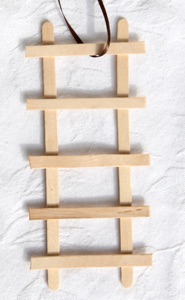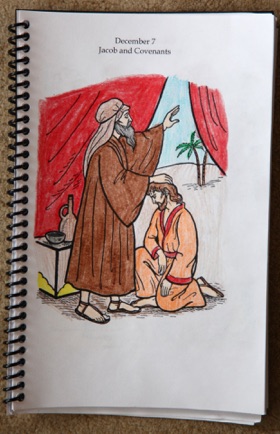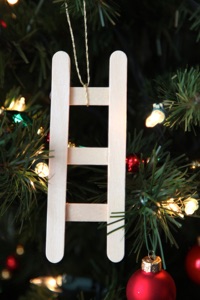Friday, December 7, 2012




December 7 - Jacob and The House of Israel - Covenant Keeping
In the Old Testament, Jehovah is called the God of Abraham, Isaac and Jacob. The Lord’s promises to Abraham were passed to his faithful son Isaac, and to Isaac’s faithful son Jacob. Although traditionally, birthrights were given to the firstborn son, Jacob (the second-born son) received his father’s birthright because he chose to keep his covenants.
We are able to make these same covenants with the Lord. Our blessings are also dependent on our faithfulness and righteousness.


Timeline: c. 1830 B.C.
Opening Song: Christmas Bells, Children’s Songbook 54
Have the children ring bells while singing.
Ornament: Ladder
I bought the ornament pictured above from Hobby Lobby, I believe. It hangs on my Christ-Centered Christmas Tree.


This is the first ladder I made. I cut up a shoelace and sewed it together like this. I can’t give it up, so this is still the one I hang on my little devotional tree.
I made several of these (for my kids’ future sets) from popsicle sticks.
My friend Julie made this ladder from craft sticks as well - looks a bit cooler with the ends cut off.
Or read Old Testament Stories about Jacob and Esau, p. 42-49. Relate the following:
In the Old Testament, Jehovah is called the God of Abraham, Isaac and Jacob. The Lord’s promises to Abraham were passed to his faithful son Isaac, and to Isaac’s faithful son Jacob. Although traditionally, birthrights were given to the firstborn son, Jacob (the second-born son) received his father’s birthright because he chose to keep his covenants.
In contrast to his twin brother Esau, Jacob kept the commandments taught to him by his parents. As commanded by Isaac, Jacob left his home to find a righteous bride. While on the journey, Jacob had a vision in which he saw a ladder reaching to heaven. Angels were going up and down the ladder. The Lord stood above the ladder and gave Jacob the same blessings given to his father and grandfather: “…And in thee and in thy seed shall all the families of the earth be blessed” (Genesis 28:14).
“Jacob realized that the covenants he made with the Lord there were the rungs on the ladder that he himself would have to climb in order to obtain the promised blessings—blessings that would entitle him to enter heaven and associate with the Lord” (Marion G. Romney, “Temples—The Gates to Heaven,” Ensign, Mar. 1971, 16).
We also make covenants with the Lord. The first covenant we make is at baptism. We promise to take upon ourselves the name of Christ, to serve Him and be obedient to his commandments. In return, Heavenly Father promises to forgive us when we repent and to bless us with the Holy Ghost. He also promises that we will live with him forever if we remain faithful. Baptism is the first rung of the ladder. Each Sunday, we renew that covenant by partaking of the sacrament. We promise to always remember Jesus Christ and to take upon ourselves His name. He promises to bless us with His Holy Spirit. The next covenants we make are in the temple.

Show GAK 122. Jacob was later named Israel by the Lord. He had twelve sons who are called “The Twelve Tribes of Israel” or “The House of Israel.” The posterity of Abraham, Isaac, and Jacob are often called “children of the covenant.” When we enter into special covenants with the Lord at baptism and in the temple, we also become children of the covenant.
All of our covenants center around Christ’s atonement, and they all lead us back to our Heavenly Father and help us to become like Him. Making and keeping covenants is like climbing the rungs of the ladder to heaven.
Closing Song: “Beautiful Savior” Children’s Songbook, p. 62
Complete Devotionals HERE.
Watch “Jacob and Esau” (2:21),
